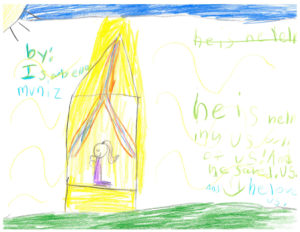 “When you can’t do what you do, you do what you can…” sings Bon Jovi inviting us to continue singing our personal stories. What songs are you singing?
“When you can’t do what you do, you do what you can…” sings Bon Jovi inviting us to continue singing our personal stories. What songs are you singing?
Isabella Muniz, 8 years old, was asked to draw a picture of how Jesus is with her and her family in this season. She went to great length carefully drawing herself kneeling. While immersed in a Christian family, she asserts her own need, humbly kneeling under the illuminating Light of God. This, for her, defies being afraid of the dark.
It is Easter Tide, the time between Easter and Pentecost, traditionally a time of celebration in the church. What does that look like in COVID-19 season? What do we do when we are afraid of the dark?

drawing by Isabella Muniz
We have quickly committed to alternative realities. Our hallmark as The Salvation Army is adaptation and instant response in crisis. We rise up and take action, serving on the frontlines, vigorously replacing activities suddenly dissolving with new ones, preferably online, creating a whole new reality of chaos as we adjust to endless hours in front of our screens, attempting to protect our integrity and create space for safe community. While many are gearing up in PPE, bravely facing challenging front line ministries, others support from behind by doing good work, navigating family, school, ministry and life, wallowing between hope and despair as monetary insecurity has become the daily song of most people we know. We miss so many things that we have hung our lives upon! One of them corporate Sunday worship in a physical space. We recreate community in online contexts. Have we ever been more connected, yet in isolation?
What does Jesus say? What are we to learn about ourselves, others, life and ministry? What are we to be and do?
The Palm Sunday message from the Gospel of Luke, chapter 19 is still lingering fresh. When Jesus is riding into Jerusalem the people are giving all of themselves to worship the King. It is hard to find a more exquisite image of authentic worship. Jesus, while encouraging, affirming and receiving their worship as important work by the people, offers clear warnings. Parallel to the praise offering, Jesus weeps over Jerusalem. Somehow, I am taking deep comfort in these contrasting affirmations by Jesus. Listen to the words of Jesus as OT prophecy is being realized through the soon to be resurrected Messiah:
1. Know ‘the things which belongs to your peace’ (Lk 19:42)
While Israel wanted an earthly king, Jesus offers another path. The Prince of Peace enters COVID-19 realities. We are stunned and speechless, discovering that all the things we thought were vital to life and ministry are being swept away. We grieve and mourn. We express hopelessness, indifference and anger. We wonder what it means to “do what you can” when “you can’t do what you do”? Then Jesus comes to us through locked doors offering peace and breathing Life into our despair.
2. Know ‘the time of your visitation’ (Lk 19:44)
Secondly, Jesus is deeply troubled that Israel missed the opportunity of God speaking to them. Jesus weeps with us when we weep for the sick and dead in our communities. Jesus comforts. Jesus also weeps when we cry about the wrong things. When we are ready for personal transformation, Jesus breaks our resistance and ideas of what life should look like. In our best moments we offer up illusions of control and Jesus fills our deepest suffering with Spirit and Life. Jesus speaks to individuals and Jesus speaks to the church. This is a time of “visitation”, a renewed invitation to surrender to Jesus.
3. Know ‘My house is a house of prayer’ Lk 19:46 (not ‘a den of robbers’!)
Christians fast and pray. Israel did that too, while filling God’s house with all kinds of things that did not belong to the Kingdom of God. Jesus is deeply disturbed and voices His anger. We cannot both pray and have it our own way. True fasting means working for justice and recognizing the breath of God in us so The Holy Spirit may transform communities offered up to participate with God in bringing in the harvest. When the fields are ripe for harvest Jesus asks us to pray for harvest workers. Are we praying? Are we rising to the occasion?
Liminal space is the space between life and death, between old and new or between sand and ocean, right at water’s edge. We are finding ourselves in liminal space. The OT prophets spent all of their lives there. It is a costly place and a place of hope. They see the present and the future, warning and encouraging people all at once. I imagine Jesus calling out to us in COVID-19 season: “Know my peace. Know my presence. Know that prayer is your life.”
Whether I can “do what I do” then seems rather insignificant. “Doing what I can” means being filled with The Holy Spirit even during Easter Tide in COVID-19 season, singing the song of surrender to Jesus, becoming propelled into freedom to be and do. That is His promise and eternal invitation to all of us.
What songs are you singing?
written by Major A. A. Margareta Ivarsson, Women’s Ministries Secretary, Social Justice Representative, Greater New York Division, USA East




